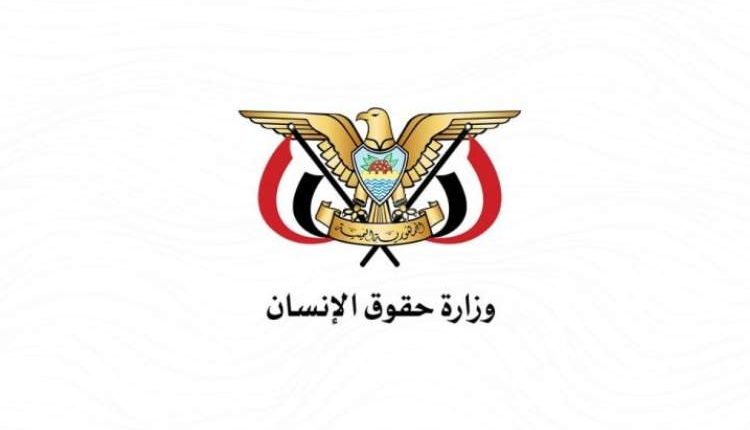HR organizes event on 75th anniversary of Universal Declaration of Human Rights
The Ministry of Human Rights on Sunday organized an event on the occasion of the 75th anniversary of the Universal Declaration of Human Rights, under the slogan “Dignity, Freedom and Justice for All”.
At the event,Deputy Prime Minister for Services and Development Hussein Maqbuli confirmed that Yemen celebrates International Human Rights Day in light of the interruption of salaries due to the transfer of the Central Bank from the capital Sana’a to Aden province in 2016 by those who claim to protect human rights and their tools from the countries of the aggression coalition and their mercenaries.
Maqbuli pointed out that the policy of starvation is a slogan and a weapon used by the aggression against the Yemeni people, ignoring the principle of dignity, freedom and justice, which the United Nations raises as a slogan for the International Day of Human Rights for eight years of unjust siege which causes the suffering of the Yemeni people every day.
He pointed out that Yemen was among the countries that set international principles and standards for human rights in 1943 but the United Nations does not apply them in Yemen despite the aggression countries’ violations of human rights against the Yemeni people.
He said, “800 items are prohibited from entering Yemen, including medicines, treatments, and medical supplies, including cancer treatments and agricultural fertilizers, and all of these are prohibited in full view of the United Nations, ” stressing that the justice advocated by the United Nations is being violated in Yemen by the countries of aggression as they bombed prisons and courts and targeted judges and lawyers.
Maqbuli explained that the end of the United Nations to renew the mandate of the fact-finding committee of experts gives the countries of aggression the right to persist the blockade and the killing of the Yemeni people, stressing that the Islamic religion gave all men and women all rights and their generosity and guaranteed their protection, and no one could be allowed to interfere in our beliefs and religion.
Minister of Human Rights Ali al-Dailami referred to the siege, violations and war crimes that the Yemeni people are subjected to by the countries of aggression in light of international silence and complicity.
Al-Dailami pointed out that the major countries that claim to protect human rights and rant about the principles of human rights are the ones who violate them the most, as they lead the coalition of aggression against Yemen, supply it with weapons, and refuse to form an international committee to investigate all crimes of aggression, adding they, the major countries, also manipulated many UN and international resolutions on Yemen and disrupted agreements and international law.
He called on the United Nations and human rights and humanitarian organizations to assume responsibility and work to stop the aggression and lift the siege on the Yemeni people.
Al-Dailami stressed the need for the United Nations and major countries to respect freedom of belief for all countries, including Yemen, stressing that the religious and Islamic principles of the Yemeni people are a red line that no one can interfere with, whoever they are, and that any calls that contradict our values and religion, everyone is against it, and will not be allowed by the the Yemeni people, which is confirmed by the UN charters.
He considered the talk of the United Nations and its affiliated organizations on side issues in light of the war and the blockade as disrespect and mockery of the blood of the Yemeni people, stressing that a number of countries, when they talk about the situation in Yemen, jump on the facts and forget the crimes and violations committed against the Yemeni people and ignore the suffering and the conditions that the aggression causes in light of international silence and complicity, calling on the United Nations and international organizations to implement human rights laws and charters on the ground and to avoid double standards in various issues.
In turn, representative of the High Commissioner for Human Rights Safir al-Din Sayed Ali stressed the importance of celebrating the International Human Rights Day to achieve freedom, dignity and justice among all human beings and to promote and pay attention to the principles of human rights.
Ali pointed out that the values and rights enshrined in the Universal Declaration of Human Rights provide guidelines for collective action, stressing that when human rights are applied, they serve as a cornerstone for policies and as a blueprint for concrete action towards development, peace and security.
He said that there are human rights violations in some countries. In Saudi Arabia, there are allegations of gross human rights violations, including torture, arbitrary detention, human trafficking, extortion, and sexual abuse of migrants seeking safety.
Ali noted the importance of putting an end to what is happening in Yemen and ending the protracted conflict, as the armistice must be renewed and expanded to enable discussions towards a more comprehensive settlement, stressing that the war on Yemen has economically affected ordinary citizens and increased their suffering and put them at risk.

